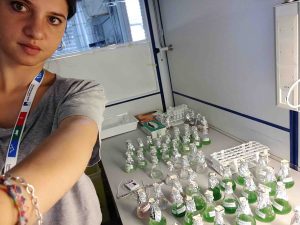Vittoria Mallia defends her thesis November 18, 2020

Vittoria defends her thesis “Potential endocrine disrupting activity of cyanobacteria – possible roles for microcystins” on November 18 at the University of Oslo. She is one of 15 early-stage researchers on the EU’s Horizon 2020 Marie Skłodowska-Curie Innovative Training Network “Protection against endocrine disruptors; Detection, mixtures, health effects, risk assessment and communication”. The work was mainly done at the Norwegian Veterinary Institute.
Cyanobacteria are cosmopolitan photosynthetic prokaryotes, which can form dense accumulations in aquatic environments. Some cyanobacterial species are able to synthesize a number of biologically active metabolites, including potent toxins (cyanotoxins), and may release them into the water. Vittoria’s project aimed to investigate the endocrine disrupting potential of cyanobacteria, with a special focus on microcystins, which is a large group of toxic cyanobacterial peptides. A parallel aim was the elucidation of the chemical structures of new microcystin congeners for which she used an interesting combination of tools including instrumental analyses, isotope labelling and chemical derivatization.
Extracts from cyanobacteria as well as pure microcystins showed endocrine disrupting activity. Receptor-mediated mechanisms did not appear to be the main mechanism of action for estrogenic activity, neither in presence nor in absence of microcystins in the cyanobacterial extracts. Instead, pure microcystin-LR (MC-LR) as well as an extract from the cyanobacterium Microcystis aeruginosa that produced MC-LR, showed an effect on estradiol biotransformation. Cyanobacterial extracts from M. aeruginosa strains and pure microcystins had also an effect on steroidogenesis, i.e. the process of steroidal hormone biosynthesis.
Vittoria was mentored by Silvio Uhlig, Chris Miles (NRC Canada), Gunnar Eriksen, Morten Sandvik and Frode Rise (UiO).